This is the third post in a four-part series on employee theft.
The Association of Certified Fraud Examiners (ACFE) in its Report to the Nation on Occupational Fraud & Abuse recently estimated that the typical business will lose an average of six percent of revenues from employee theft, and according to the U.S. Chamber of Commerce employee theft is major factor behind one-third of business bankruptcies.
The bottom line is that employee theft is serious business, and making a conscientious effort to prevent it deserves the attention of any small business owner who hires employees.
The following are a few tips to help you prevent employee theft in your small business:
Create an anti-theft policy.
Your business’ anti-theft policy should include several key elements. First, you should establish clear guidelines and procedures for handling inventory, supplies, equipment, cash, receipts, and any sensitive information. Describe what happens when employees are caught stealing from the company, including the process of warnings, firing, and pressing charges.
Keep in mind that your policy should address the most common forms of employee theft including stealing cash, inventory, equipment, or supplies, conducting shipping and billing scams, forging receipts, faking an injury and claiming compensation, and putting fictitious employees on the payroll.
You should also mention any internal controls your business has in place (such as installing cameras or conducting random audits) to prevent theft.
Make sure your employees understand the rules.
The most well thought out and comprehensive anti-theft policy will be limited in its effect if employees are unaware of the consequences of stealing from the company. All employees should receive the business’ anti-theft policy in writing, and every employee should be required to sign a form to verifying receipt of this information.
Screen your employees.
Running background checks on potential new hires may seem like a time consuming or costly process, but it will save you a lot of time and money in the long run should you hire someone who later proves to be problematic. Though you can never be completely sure that the people you are hiring will be trust worthy, by screening any new hires you can effectively reduce the number of dishonest employees that you bring into the business.
When conducting a background check be sure to look for any criminal records and involvement in lawsuits You should also verify their stated level of education and degrees at accredited institutions as well as an employment verification of positions, length of employment, and reasons for leaving.
Keep in mind that there are several companies that can run background checks for you. But you should still check the candidate’s references and talk to previous employers.
Monitor operations.
Keeping a watchful eye on your business’ operations will help you both prevent theft and spot any suspicious activity. You should also being setting up a system of internal controls with a focus on financial reporting and your business’ precious assets. Here are some common ideas:
-
Set up surveillance cameras, do a random walk-through in your business, and conduct unannounced audits and spot inspections.
-
Access to physical and financial assets as well as sensitive information and accounting systems, should be restricted to the employees you trust.
-
Establish an anonymous or confidential reporting system for employees, vendors, and customers to report any violations of policies and procedures without fear of repercussion.
Create a positive work environment.
Incidents of theft often go hand-in-hand with financial or emotional stress. As stress levels increase, so does crime. Make sure your employees feel valued and that the lines of communication are open- even if you have had to make reductions in employee bonuses and benefits. When employees trust their employers they are more likely to act in the best interests of the business.

